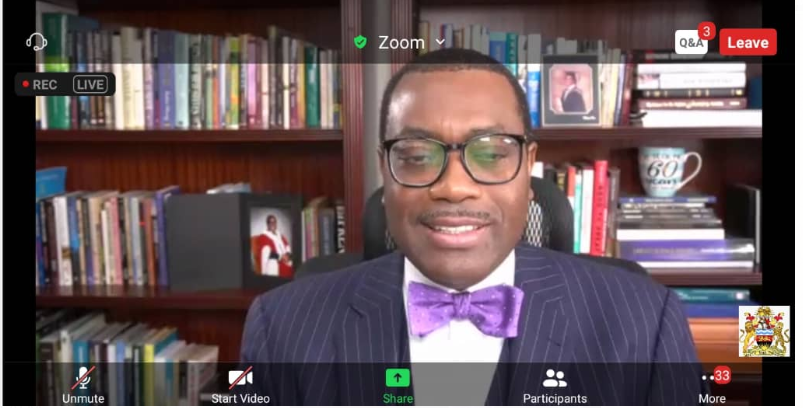Dr. Akinwumi Adesina, President of the African Development Bank (AfDB)
Dr. Ken Giami, Publisher of the African Leadership Magazine & Chairman ALG Strategy Group
Senator Manqoba B. Khumalo, Minister of Commerce, Industry & Trade in the Kingdom of Eswatini
Rep. Billy Mitchell (GA), President of National Black Caucus of State Legislators, USA.
My Fellow Speakers, All Dignitaries here today, Ladies and Gentlemen,
As Malawi’s President, I have been given the honour of presently chairing the Least Developed Countries Group (LDCs), holding Malawi’s membership seat on the United Nations Human Rights Council. As well as chairing the Southern Africa Development Community (SADC) in the new year. These are all roles on the global stage, and each of them is partnership-intensive, with serious implications on our prospects for economic recovery. For this reason, I am delighted to address you on the theme “Rethinking Global Partnerships and Africa’s Economic Resurgence”, because the relevance of partnerships to our context is beyond dispute.
There is a Kenyan proverb that says that “No good food can be chewed unless your teeth are working together”. The meaning of this is similar to the meaning of our own Malawian proverb which states that “One head cannot carry a whole roof”. Across our great continent, we have these idioms from our elders to remind us that there is very little good in this world that does not result from strategic partnerships.
My own journey to the office I hold is a testament to the power of partnership. I was elected President on the ticket of a party that was leading a 9-party alliance called “Tonse”, a word from our vernacular that means “All of Us”. That word captures the multi-layered partnerships that made our victory not just possible, but inevitable.
Now that we are here, we owe it to posterity to leverage the partnerships we have and forge new ones to expedite the resurgence of our economy. I believe this to be true not just for Malawi, but also for Africa. If we are to achieve Economic Resurgence for Africa, we must strengthen our Global Partnerships. My central proposition in this respect is that African governments must be at their best in order to get the best partnerships on offer.
This is why my chosen title today is: “CLEANING HOUSE FIRST: Good Governance as a Key to Unlocking Global Partnerships for Shared Prosperity”
From the period of May 2019 to May 2020, the Malawian People valiantly defended their right to vote and were in a fierce battle for justice, out of which they emerged victoriously and ushered in a new government. However, it was also within this time that COVID-19 Pandemic reached its peak, killing millions of people around the world. Countries went into lockdown, but when the embattled government of Malawi tried to follow suit, the decision met heavy resistance from the people, resulting in the cancellation of the lockdown. It may seem strange that a people would refuse to comply with a lockdown meant to protect them from a deadly virus, but on close inspection, there is a simple explanation: When people do not trust their leaders to govern them, they also do not trust them to protect them.
In this example and many others like it around the world, the COVID-19 Pandemic has taught us that poor governance damages public trust in government interventions. In turn, this loss of trust hinders public response to crises. For this reason, since taking my oath of office, it has been my singular mission to restore public and investor trust in our governance institutions by embarking on a statewide clean-up of the same. This is an exercise that is already bearing fruit in attracting strategic partnerships of goodwill from around the
world, which proves that our strategy is credible. Even the metrics of international institutions attest to the impact of our efforts. For instance, Freedom House recently declared that its assessment of the state of Democracy in the Covid-19 era showed that Malawi is the only country in the world whose democracy has grown stronger during the pandemic. Specifically, our experience shows that key to our success in rebuilding our governance capabilities has been a few components that are worth highlighting.
FIRST IS THE RULE OF LAW: This is a prime catalyst for development and national growth. From the period of May 2019 to May 2020, the Malawi Judiciary had the Herculean task of presiding over an Elections Case that would shape Malawi’s governance for generations to come, and they did it under the most acrimonious of circumstances and against the toughest odds, including threats of violence and attempted bribes. Their integrity in refusing to be moved not only delivered justice for Malawians but also gained Malawi international acclaim through the winning of the prestigious Chatham House Prize awarded to the Five Judges of the Constitutional Court. I am sure that this did not go unnoticed,
for it can be no accident that this was followed by Malawi’s subsequent election to the United Nations Human Rights Council.
SECOND IS A RADICAL REFORM AGENDA: Currently, my Administration is pursuing Public Sector Reforms spearheaded by the presidency through the office of the Vice-President. We believe that the Public Sector must be in top shape to prepare for and respond to crises and changes in global climates before they occur. Such preparedness will put our countries in a stronger position to contribute to Global response and Global strategy, especially in the achievement of the 2030 Sustainable Development Agenda.
As Malawi has shown the world, it is impossible to build a strong Governance framework if either the Civil Service and the Civil Society are stuck in a cycle of lethargy, greed, and partisanship. Our reforms agenda is designed to move us away from an activity-focused model of delivery to a results-focused model anchored by the best practices of innovation, efficiency, and patriotism.
THIRD IS MULTILATERAL AFRICAN INTEGRATION: African Leaders must join forces in combatting corruption and protecting civil liberties in our countries. Our law-enforcement and military must be used for protecting citizens, not stifling them. As Malawi is anticipating to Chair SADC from 2021, I have already made visits to six countries in the region to strengthen ties in readiness for a renaissance in our nations. The Peace and Security of the Southern Africa region is a priority area worthy of the world’s attention, not only because of the political unrest that several countries in this region have faced over the past 5 years but also because of the unique economic opportunities it offers.
But we cannot attract the world to our nations if our nations are in disarray. We must have order and we must have it collectively. We cannot have good governance in one part of Africa if it is routinely being undermined in another part. As such, those who are leading in the creation of good government have a duty to spread their methods across the region to strengthen our collective capacity to deliver world-class services. In this regard, Malawi is a great example of how a return to good governance positions a nation to have a credible voice on the world stage.
For our part, we have already used our voice to lobby for better conditions for all African nations at various multilateral fora, including a call for permanent seats for African states on the United Nations Security Council, a call for the cancellation of sub-Saharan Africa’s debt, and a call for equilibrium in the rules of engagement for global trade. No one in the world would listen to us or take us seriously if it became evident that none of our own people even trust us to govern them well. Malawi is finally open for global business and global partnerships because Malawi is finally closed to lawlessness and chaos.
Thank you for your attention.


